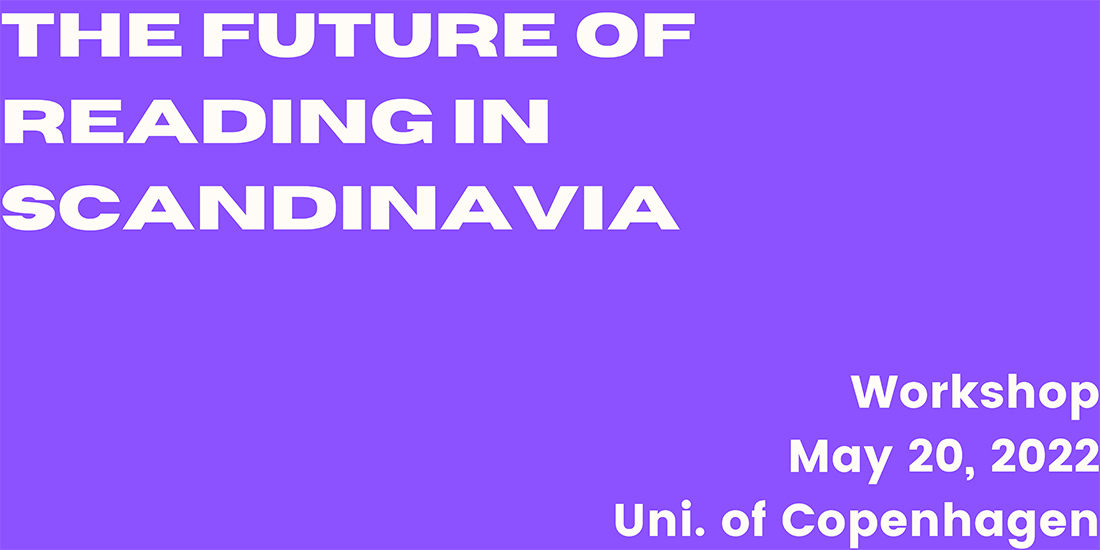The future of reading in Scandinavia
Reading is a hot question in language, arts, and cultural studies departments all over the world. In understanding reading as a key human activity, how should we approach it academically? For who is reading important? What does reading mean in terms of socialization and cultural transfer of ideas? How does reading change, historically and with new technological advances, and what is the status of reading today? How do we conceive of the relation between the literary scholar’s own reading of a text and the ways literature is being read and used in other settings? Is there a distinctive Scandinavian perspective on reading?

At the Department of English, Germanic, and Romance Studies at the University of Copenhagen, the research project Lockdown Reading has taken on these questions in the event of the global Covid-19 pandemic. Now we want to invite scholars from all over Scandinavia to contemplate where this discussion is going in the future.
With this workshop, we make it possible for researchers who work with questions about reading in various ways to meet and exchange ideas. We wish to establish a forum, where researchers who do not cross paths on a day-to-day basis can engage in a common discussion across universities in Scandinavia.
The program is shaped around five round table discussions and collective reading of a text chosen by the organizers. The workshop is open to everyone, and you are more than welcome to attend just part of the program.
| 09:30 | Arrival |
| 10:00 |
Welcome |
| 10:10 |
Roundtable 1: How do digital platforms and digital life influence reading in general and/or methodologically? |
| 11:00 | Break |
| 11:10 | Roundtable 2: How does reading shape thought, and/or what effects can deep/absorbed reading bring the reader? |
| 12:00 | Lunch |
| 13:10 | Roundtable 3: What is the role of reading in everyday life, and/or how can reading be studied as an everyday or lay activity? |
| 14:00 | Break |
| 14:15 | Roundtable 4: How is reading involved in the making of a text, and/or what would it mean to do a just reading of a text? |
| 14:55 | Break |
| 15:15 | Roundtable 5: How is reading related to its performance and setting, and/or what are the implications of reading in the social? |
| 15:55 | Break |
| 16:10 | The Future of Reading? Collective reading: ‘Human and Machine Cultures of Reading: A Cognitive-Assemblage Approach’ by Katherine Hayles |
| 16:50 | Concluding remarks |
| 17:00 | Break |
| 18:30 | Dinner for roundtable participants, Pirlo, Strandlodsvej 42a, 2300 Copenhagen S |
Roundtable 1
- Sara Tanderup Linkis, Lund University
- Jens Bjerring-Hansen, University of Copenhagen
- Mathies Græsborg Aarhus, University of Southern Denmark
- Anne Mangen, University of Stavanger
Roundtable 2
- Kristiane Hauer, Danish School of Education, Aarhus University
- Christina Lupton, University of Copenhagen
- Juan Toro, University of Southern Denmark
- Christian Benne and Irina Hron, Zoom connection from Vienna
Roundtable 3
- Gitte Balling, University of Copenhagen
- Ben Davies, University of Portsmouth
- Tobias Skiveren, Aarhus University
- Line Dalsgård, Aarhus University
Roundtable 4
- Stefanie Heine, University of Copenhagen
- Stefan Kjerkegaard, Aarhus University
- Maria Damkjær, University of Copenhagen
Roundtable 5
- Louise Mønster, Aalborg University
- Mette Steenberg, Aarhus University
- Solveig Daugaard, University of Copenhagen
Organizers
Johanne Gormsen Schmidt, University of Copenhagen
Amanda Grimsbo Roswall, University of Copenhagen
Registration
Please write to the organizers Johanne Gormsen Schmidt or Amanda Grimsbo Roswall if you would like to attend.
If you have any questions or comments about the workshop, please don’t hesitate to get in touch by sending an email to the organizers.
Text for collective reading
Katherine Hayles: “Human and Machine Cultures Reading: A Cognitive-Assemblage Approach,” PMLA 133.5 (2018), pp. 1225-1242.
Map of South Campus
View directions.
View on map of the Faculty of Humanities - South Campus.
View map of South Campus (pdf).
